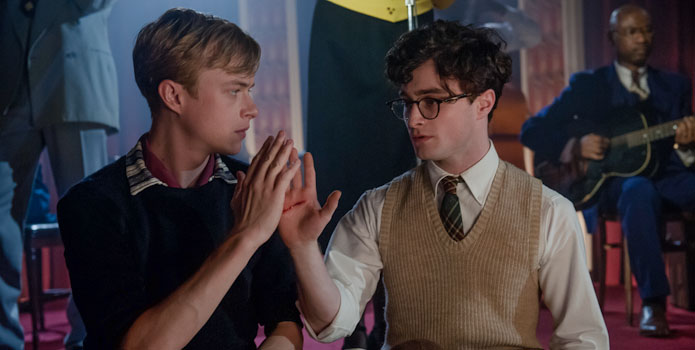TIFF13: Kill Your Darlings (2013)
Kill Your Darlings is a sadly inept film. The debut feature of John Krokidas, the film lacks focus and has a woefully miscalculated visual style. Itfollows a young Allen Ginsberg and his relationship with William S. Burroughs, Jack Kerouac, and most importantly, Lucien Carr. Thus, this story has especial interest to poets and people with homosexual sympathies, but this film seems to lack any true understanding of either the characters or the poetic notions they stood for. It cannot make up its mind about what story it’s trying to tell and who its characters really are.
There are positive aspects of Kill Your Darlings. Daniel Radcliffe again shows a keen knack for distancing himself from Harry Potter. Radcliffe gives the kind of confident, layered performance as a young Allen Ginsberg — confused about his identity and on the cusp of poetic breakthrough — that verifies my belief in him as a viable leading man. He has range and depth and natural likeable — important things for a movie star. Ben Foster and Jack Huston are also good in their small roles as William S. Burroughs and Jack Kerouac, respectively.
But Kill Your Darlings makes a major misstep with its portrayal of Lucien Carr. Dane DeHaan impressed critics with his breakthrough role in last year’s Chronicle, but in The Place Beyond the Pines and now Kill Your Darlings, he has demonstrated a profound lack of range. His performance is all pouty eyes and muttered affectations. The material hardly helps him deliver a good performance as Krokidas cannot make up his mind about Carr. He both romanticizes him as the catalyst for Ginsberg’s sexual and poetic awakening, but also damns him as an unrepentant, self-hating homosexual.
The film’s style is also indicative of a director without a clear vision. It is overly reliant on close-ups and uses the gloss of shallow-focus lens to bombard audiences with shots of gorgeous young men. It’s a digital vision of an analog era — shallow and devoid of character. The music is also at odds with itself. The score is sentimental pap, going against the anarchistic emotions the characters stood for. As well, the decision to utilize contemporary music in a few choices scenes is a glaring tonal error. I like Bloc Party and TV on the Radio, but their music does not sit well beside Billie Holliday.
During the Q&A after the film, Krokidas said his motivation in making the film was the infuriation over the fact that in the 1940s a man could legally get away with killing a homosexual if he accused the man of making advances upon him. Although I can understand his righteous anger, such righteous messagemaking fatally wounds Kill Your Darlings. It splits the film’s focus in such a way that there is no unified perspective. It cannot decide whether it is a tale of poetry and the maturation of Allen Ginsberg, or a sad rumination on masculinity and closeted homosexuality. Krokidas is trying to make it both, but he fails miserably in doing so.
3 out of 10
Kill Your Darlings (2013, USA)
Directed by John Krokidas; written by Krokidas and Austin Bunn; starring Daniel Radcliffe, Dane DeHaan, Michael C. Hall, Jack Huston, Ben Foster, David Cross, Jennifer Jason Leigh, Elizabeth Olsen, and Kyra Sedgwick.
Kill Your Darlings played on Sept. 10 and 11 during the Toronto International Film Festival as part of the Gala Presentations program.
